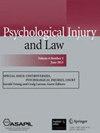Results of Symptom Validity Testing in Portuguese Prison Inmates: The Influence of Educational Level, Age, and Conviction Status
IF 2.7
Q2 PSYCHOLOGY, CLINICAL
引用次数: 0
Abstract
Abstract Current guidelines for psychological assessment recommend the use of multiple validity measures in an evaluation protocol, particularly in forensic settings. As such, self-report instruments which detect distorted symptom reporting have become essential. We studied a pooled sample of 240 male inmates with the Self-Report Symptom Inventory (SRSI), the Structured Inventory of Malingered Symptomatology (SIMS), and the Symptom Validity Scale–Version 2 (EVS-2). Concurrent validity was analyzed via correlations between all three symptom validity tests (SVTs), revealing strong associations ( rho ranging from .72 to .79), and ROC analyses yielded areas under the curve (AUC) values over .9 for every model. Base rates of SVT failure ranged from 7.9 to 13.3% using the most conservative cutoff scores, although true and false positive rates were not established. Education was shown to have a statistically significant effect on the mean results of the three SVTs ( rho ranging from − 162 to − 283), associating lower educational levels with more bogus symptom endorsement. The influence of age and conviction status (pre-trial vs. post-trial) on the SIMS results was statistically significant as well ( rho estimates of .171 and − 232). With data showing robust construct validity and excellent predictive accuracy, the instruments were shown to be adequate for use in the Portuguese prison context, but further research is required, in particular using forensic inpatients and clinical populations, and including systematic data on the presence of mental disorders.葡萄牙监狱囚犯症状效度测试结果:受教育程度、年龄及定罪状况的影响
当前的心理评估指南建议在评估方案中使用多重效度测量,特别是在法医环境中。因此,检测扭曲症状报告的自我报告工具变得必不可少。本研究采用自报告症状量表(SRSI)、结构化症状量表(SIMS)和症状效度量表(EVS-2)对240名男性囚犯进行了研究。通过所有三个症状效度测试(svt)之间的相关性分析并发效度,发现强关联(rho范围为0.72至0.79),ROC分析得出每个模型的曲线下面积(AUC)值均大于0.9。使用最保守的临界值,SVT失败率的基本范围为7.9%至13.3%,尽管真阳性率和假阳性率尚未确定。教育水平对三个svt的平均结果有统计学显著影响(rho范围从- 162到- 283),较低的教育水平与更多的虚假症状认可相关。年龄和定罪状态(审前与审后)对SIMS结果的影响也具有统计学意义(rho估计为0.171和- 232)。由于数据显示了稳健的结构有效性和出色的预测准确性,这些工具被证明足以用于葡萄牙监狱的情况,但还需要进一步的研究,特别是使用法医住院病人和临床人群,并包括关于精神障碍存在的系统数据。
本文章由计算机程序翻译,如有差异,请以英文原文为准。
求助全文
约1分钟内获得全文
求助全文
来源期刊

Psychological Injury & Law
PSYCHOLOGY, CLINICAL-
CiteScore
5.70
自引率
25.80%
发文量
29
期刊介绍:
Psychological Injury and Law is a journal designed as a multidisciplinary forum for the dissemination of research articles and scholarly exchanges about issues pertaining to the interface of psychology and law in the area of trauma, injury, and their psychological impact. The journal intends to help build the evidentiary research base of the field, and to critically examine its concepts and practice. Psychological impairments and disabilities may arise from physical and/or mental injuries ascribed to alleged negligent actions. They need to be judiciously assessed for their validity, and treated when evaluated as valid. They lead to legal and related action when there are long term or permanent effects.
 求助内容:
求助内容: 应助结果提醒方式:
应助结果提醒方式:


